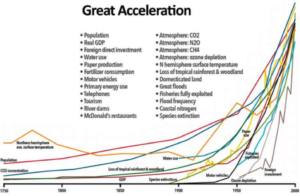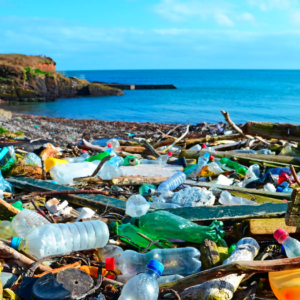By Simon Ticehurst – Movements Lead, Wellbeing Economy Alliance
We knew our current economic system and the climate were deeply connected 50 years ago and as we recognize another Earth Day, when looking at today’s worsening environmental crisis, I cannot help but think that this was as predictable as it is preventable.
Predictable because 50 years ago the current scenarios of overshoot and environmental collapse were forecast by the Club of Rome’s iconic “Limits to Growth” report, now recalled with propositional urgency in their “Survival Guide for Humanity.”
Preventable because we could have been using alternative economic frameworks that put the economy at the service of people and the planet, instead of the other way around, the way it is now.
The conventional and still dominant view of modern economics is that goods and services are most efficiently produced by profit-maximizing corporations owned by and for the prime benefit of private shareholders. Businesses are seen as “wealth creators” that drive innovation, technological progress and generate jobs. The bureaucratic State should not intervene because free markets in competition will ensure the right rewards and prices.
Simple and convincing. Except that, this unchecked paradigm of privatization, deregulation, and the liberalization of markets, trade and finance, has directly led to an unprecedented and predictable concentration of wealth and power, as well as the accelerating climate crisis. It has dramatically and rapidly failed both the majority of people and the planet.
How did we get here?
Since the middle of the last century, we have witnessed what has been called the great acceleration, with exponential increases in population, transportation and telecommunications to connect our urban populations, the use of fertilizers and pesticides to grow more food, and energy and water to drive our industrial development. All resulting in the exponential growth of our economic activity, measured by Gross Domestic Product (GDP).

However, GDP as a measurement of economic activity has ignored the devastating impact of this great acceleration on our earth systems, to the degree we now refer to a new geological era as the Anthropocene – an era defined by the impact of human economic activity.
What is the environmental impact?
The Intergovernmental Panel on Climate Change (IPCC), the United Nations scientific experts, have provided regular reports since 1990 documenting the severity of the human-induced climate crisis in:
- An increase in global warming.
- The loss of ice caps (Greenland/Arctic) and glaciers.
- Sea level rise and warming of the oceans.
- CO2 and greenhouse gas emissions.
- Extreme weather and weather-induced events – drought, floods, heat waves, hurricanes, desertification, forest fires
- Acidification of the oceans (changing ocean chemistry and causing dramatic loss of phytoplankton, which feeds the marine food chain).
Climate change is not the only negative impact, however. The connected loss of biodiversity through deforestation and excessive use of toxic agrochemicals is causing what some are calling a 6th mass extinction. The World Wildlife Fund´s latest Living Planet report documents a 68% average decline of species since 1970, hence, mass extinction.
Our consumer economy also erodes and wastes our environment. Profit needs growth, growth needs consumption. We largely buy, consume and throw away. Planned obsolescence is deliberately built into the design of goods. Growth by maximizing throughput and maximizing output is highly resource intensive and ignores the true cost and “externalities” of the impact on the environment, through the extraction and exploitation in the process of growing economic expansion. This is reinforced by marketing and advertising, and hyper-consumption cultures, in which people are encouraged to continuously buy and throw away. Great for GDP, but actually really bad for our common home.

A recent Wellbeing Economy Alliance paper argues that our economy is obtaining and using materials in a way that is undermining our collective wellbeing, by destroying our ecosystem through wasteful production and consumption practices.
We are exceeding the rate of regeneration of renewable resources and the absorptive capacity of the environment for wastes. Greenhouse gasses are dangerously warming the planet, plastic waste is choking our oceans, agrochemicals are seeping into water systems, air pollution is suffocating our cities. We are overshooting the carrying biocapacity of Earth and dangerously exceeding the planetary boundaries.
Key global environmental organizations, like Greenpeace , WWF , Friends of the Earth, Climate Action Network , Planetary Health Alliance make explicit links between the climate crisis and our economic systems. The upcoming WEAll Talk with the Planetary Health Alliance on April 26th is etitled: Why your life depends on economic systems change.
Who is driving this car off the cliff?
Well as consumers, we all are, in the choices we make. We are all responsible, but some have much more responsibility than others. Rich countries, the World Bank, the IMF and the World Trade Organization largely set the rules. Elites in the global north and in the majority world unduly influence those rules. Inequalities generated by the system allow powerful economic actors to delay or block much-needed reforms and undercut social and environmental standards, and lobby for the status quo, thus reinforcing the negative spiral of further inequality and environmental destruction.
Who benefits from this system?
The 2023 Oxfam report on inequality “Survival of the Richest” claims the richest 1% have bagged nearly twice as much wealth as the rest of the world put together over the past two years.
The report shows that 95 food and energy corporations more than doubled their profits in 2022. They made $306 billion in windfall profits, and paid out $257 billion (84 percent) of that to rich private shareholders.
Oil giant ExxonMobil announced it made almost $56 billion last year and Chevron made $35.5 billion – this is larger than the gross domestic product of more than 100 nations.
Last year, the Guardian newspaper revealed that oil and gas companies have been making close to $3 billion in pure profit every day for the last 50 years.
And taxpayers are subsidizing this. Fossil fuel subsidies amount to as much as $5.9 trillion, more than double the sorts of investments needed to keep the planet below 2 degrees centigrade, as urged by the Paris agreements. (Ecocide Law for an Economy within Planetary Boundaries p 37).
Our economic system itself has now become uneconomic. It is failing the majority and creating more problems than it solves, undermining communities and the environment. We spend more and more trying to survive and cope, fixing the problems and cleaning up after the mess (a phenomenon called failure demand). Ironically, failure demand can be good for GDP, which we obsessively, and mistakenly use as the measure of success. All of this was predictable.
So how could a wellbeing economy turn this around and prevent this decline?
- Repurpose the economy so it serves wellbeing. More circular, regenerative economies, powered by renewable energy, that design out waste and pollution, keep products and materials in use, and regenerate natural systems. More widespread agroecology for a more sustainable agriculture. Adopt the 5 “Rs” of Zero Waste: Refuse, Reduce, Reuse, Recycle, Restore.
- Design the economy in a way that stops harm happening in the first place. Look upstream and focus on changes there rather than focus on helping people “cope and survive” with the damage we are causing. According to the German Federal Environmental Agency, as much as 80% of environmental impact is a product of design.
- Change the goals of business so that companies are certified based on how they create value for non-shareholding stakeholders, such as their employees, the local community, and the environment, and how they generate social and planetary wellbeing and impact, rather than private profit. See for example Sistema B in Latin America and globally B Corps.
- Encourage more democratic ownership of the economy through cooperative and public governance structures and more collective management and ownership of businesses, land, housing, natural resources and how these are stewarded, to ensure that social costs and environmental “externalities” are accounted for in decisions.
- Transform Finance: by scaling down harmful investments (fossil fuels) and scaling up new purpose-oriented social and environmental objectives, public banks, cooperatives, green investment funds or social wealth funds. Decolonize the global economy through climate justice to ensure the burden of adaptation and mitigation is shouldered by those most responsible. Canceling debt to free up funding for countries to pursue social and environmental causes. Committing to climate finance targets and addressing loss and damages, particularly for the most vulnerable countries and peoples, who have historically contributed the least to the current climate crisis. Majority World countries are worst affected by and more vulnerable to the climate crisis, yet they spend five times more on debt payments to global financiers than on dealing with climate change.
- Tax systems, incentives and subsidies that value this new purpose. Abolish fossil fuel subsidies. Introduce windfall taxes and an annual wealth tax. Taxing up to 5 percent on the world’s multi-millionaires and billionaires could raise $1.7 trillion a year, enough to lift 2 billion people out of poverty, and support poorer countries being ravaged by climate impacts, and deliver universal healthcare and social protection for everyone living in low- and lower middle-income countries.
- Use wellbeing frameworks instead of GDP to measure success and frame the right set of policies. Some governments are already doing this. The Wellbeing Economy Governments partnership (WEGo) is a collaboration of national and regional governments (Scotland, New Zealand, Iceland, Wales, Finland and Canada) advancing their shared ambition of building Wellbeing Economies. The Icelandic government introduced their Indicators of Wellbeing program in 2019, which examines various factors like greenhouse gas emissions, mental health, life expectancy, poverty, and education. GDP is only one of 39 indicators. Similarly, the Scottish government implemented a Wellbeing Economy Monitor in 2022, which monitors indicators ranging from health and inequality to greenhouse gas emissions, rooted in the National Performance Framework.
- And rewrite the rules of the economy to serve these different ends (through legislation, regulation, taxation) for an alternative future, and for future generations. A great example is the Wellbeing of Future Generations Act in Wales.
We designed this economy to make record profits and grow, but we can design it with a different purpose, and regenerate our planetary health. We do really have a choice.
the discussion?
Let us know what
you would like
to write about!
